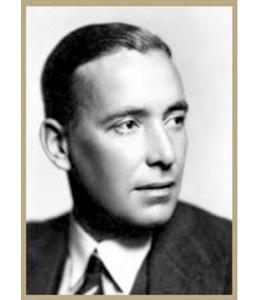Eric was the elder son of George Dance and his wife Grace Spong. He was born at Moorcroft, The Heath, Weybridge, Surrey in 1900. He had an older sister, Phyllis, and a younger brother, James who was MP for the Bromsgrove Division of Worcestershire; and PPS to the Secretary of State for Air, 1955-61.
His father was a prolific songwriter and the author of “Come Where Me Booze is Cheaper”, “Angels without Wings” (sung by Vesta Tilly), and “His Lordship Winked at the Counsel” (sung by Harry Rickards). He made a fortune with his musical comedy “The Chinese Honeymoon”, which established the reputation of Louis Freear. His music hall interests were of a varied kind. His most consistent undertakings being the management of innumerable tours of musical comedies. His musicals “The Gay Parisienne” and “A Chinese Honeymoon” were two of the longest-running musicals ever to be staged in the London theatre.
His fortune enabled him to give considerable assistance towards the stabilization of the Old Vic as a permanent Shakespearean repertory theatre, for which he was knighted in 1923. He was the richest theatrical manager of his day, always lunched at Romano's, a famous restaurant in the Strand, where he hatched many of his big schemes which never failed because of the power of the brain behind them. Daily he sat and pondered after lunch, a crème de menthe before him. It helped his indigestion! He was no drinker and did not let his staff drink, either. A curious man, but a great man who should live in memories.
Acknowledgement to the Encyclopaedia of the British Music Hall and arthurlloyd.co.uk
Sir George left £157,272-14-6.
From before 1925 until after Sir George’s death, the Dances lived at The Holme, a Regency villa situated on the Inner Circle, Regent's Park. It was designed by Decimus Burton for his father James Burton in 1819 as part of John Nash's grand design for Regent's Park. The original park design was to include fifty-six villas, but only eight were built. The building is Graeco-Roman in style with a Corinthian portico east entrance front. It has two storeys, and is stuccoed with a slate roof. Its gardens run down to the lake.
Eric matriculated in 1920. Whilst at Christ Church he took part in many theatrical productions as an actor. After Oxford, he qualified as a barrister.
In January 1925, he visited New York sailing from Liverpool on the Adriatic. He described himself as a barrister & son of Sir George Dance with his address at The Holme. In June 1932, he returned from Rio de Janeiro on the Asturias. He seems to have given up the Bar, by then, as his occupation is “Member of Lloyds” In March 1937, he returned from Rio, again. He was living at 33, Dover Street, W. In January 1939, travelling with a valet, he arrived in New Orleans from Cuba and returned to England in March. By then he was living at Round Cross, Berkshire.
After the death of his father, he went to RADA and joined the Oxford Playhouse Repertory Company becoming co-director and producer with Stanford Holme. In 1936, he invested a substantial part of his inheritance to help fund a new, purpose-built home for the Company in Beaumont Street, Oxford.
Joining up at the outbreak of war, he served as a captain in the 35th Light Anti-Aircraft Regiment and went to the Far East.
On 10 April 1942, The Times carried an advertisement “No news since the Fall of Singapore. Any information will be gratefully received by his mother, Lady Dance, Raylands, Maidenhead. [Australian and Indian Papers, please, copy.]”
On 26 October 1945, The Times announced his death “Beloved and devoted eldest son of Lady Dance, now officially reported to have died whilst a Prisoner of War in Japanese hands on April 30 1943.”
He had died in a Japanese POW camp in New Guinea in 1943. His name is on Panel I of the Singapore Memorial.
"Without his vision, civic aspiration and generosity, there might have been no Playhouse in Oxford at all."


